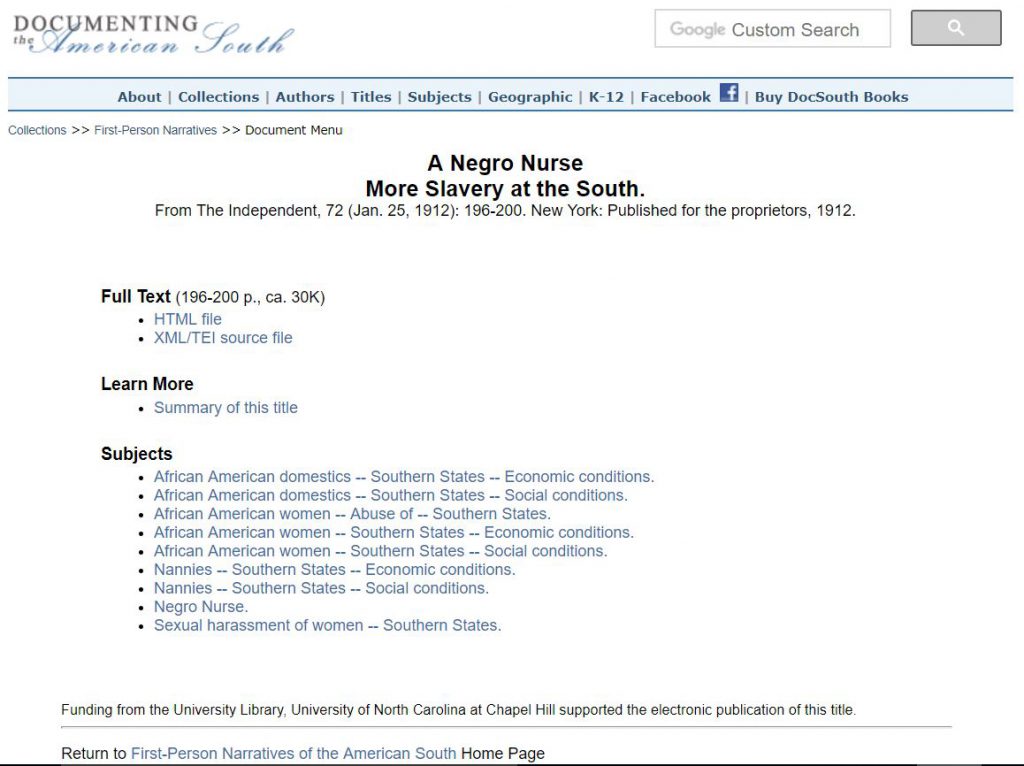After multiple class sessions introducing our archival and manuscript collections and oral history best practices, students in Dr. Nneka Dennie’s Spring 2019 AFR 329: Women & Slavery in the Black Atlantic course produced a documentary using oral histories created throughout the semester. These materials will be donated to the Archives.
In addition to this main project, students were tasked with identifying primary sources from local archives, historic sites, and/or repositories that shed light on the lived experiences of enslaved women or women enslavers. The following series of blog posts are authored by these students upon the completion of this archival research process and serve as reflective pieces.
Thank you for your submissions-and a wonderful semester of fruitful collaborations!
“The Other Perspective”
written by Ashley Ip
History is made up of various stories told from different aspects and in some cases, said stories get distorted over time. It is the duty of historians to analyze who is telling these stories and who is left out in order to paint a full picture. Black women are often left out of the discussion when discussing slavery in the South. This can be attributed to the lack of sources and primary documents that focus on the role that Black women played during slavery. Archival research is important because it gives voice to those who are often left out in the retelling of history. These documents are vital to the research of Black women because it provides historians with a perspective that is often overlooked.
The article “More Slavery at the South” is a transcribed interview with an anonymous African American woman. This source was actually written by a reporter for The Independent. This African American woman is a nurse and goes into detail about the hardships she encounters as a Negro nurse in the South. Although this source was published after slavery was abolished in the United States, this document gives a first-hand look into Jim Crow laws and the way it affected daily life for Black women in the south.
This nurse goes into detail about the demands of her job by describing herself as the “slave, body and soul of [the] family.” She backs up this claim by explaining that she works “sunrise to sunrise, every day in the week” and thus, “[doesn’t] know what it is to go to church; [doesn’t] know what it is to go to a lecture or entertainment of anything of the kind.” She lives a life that is controlled by the family who she works for. From “watering the lawn with the garden house, sweeping the sidewalk, mopping the porch and halls, helping the cook, darning stockings of putting the three children to bed, she must “tamely submit and answer when called.”

Not only were the work conditions horrendous, the wage is a “pitiful sum of ten dollars a month.” She explains how she struggles to get by because she has to pay house rent, feed and clothe not only herself but for her three children. She understands that nothing will be done to increase her wage because she means to the white family she works for, she is easily replaceable. If she were to quit, she understands “there would be hundreds of other negros right on the spot ready to take their places and do the same work, or more for the low wages that had been refused.” Thus, she must settle to work for less than nothing.
She also very eloquently explains how she must always present herself within the relationship of master and servant as she recalls her experiences on railroad trains and street cars. As long as she is with the white children and explains to white men when they ask that she is their servant, she will not be questioned when she sits in the white man’s coach. However, as soon as she doesn’t present within this relationship, she is subjected to the “colored people’s coach” section of the railroad.
Lastly, this nurse touches on something that is often very overlooked within the Black women experience – the sexual mistreatment and abuse they were forced to endure from their male employers. She adamantly claims that this is by far the worst part of her experience and that white men are always able to get away with their misconduct. When she reported to her husband that her madam’s husband tried to kiss her, her husband confronted him and was slapped and arrested. The police judge fined her husband $25 and the white man denied the charge. The judge looked up and said “The court will never take the word of a nigger against the word of a white man.” All white men are able to take their “undue liberties with their colored female servants.” This nurse emphasizes the need of research on Black women. By ignoring Black women’s experiences, historians unintentionally excuse white mens sexual abuse.
Archival research into Black women is vital to understanding the impact of slavery in the United States. By failing to incorporate Black women in scholarly discussions and conversations, a full picture cannot be painted.
Source:
A Negro Nurse, More Slavery at the South. From The Independent, 72 (Jan. 25, 1912): 196-200. New York: Published for the proprietors, 1912.https://docsouth.unc.edu/fpn/negnurse/negnurse.html

Speak Your Mind